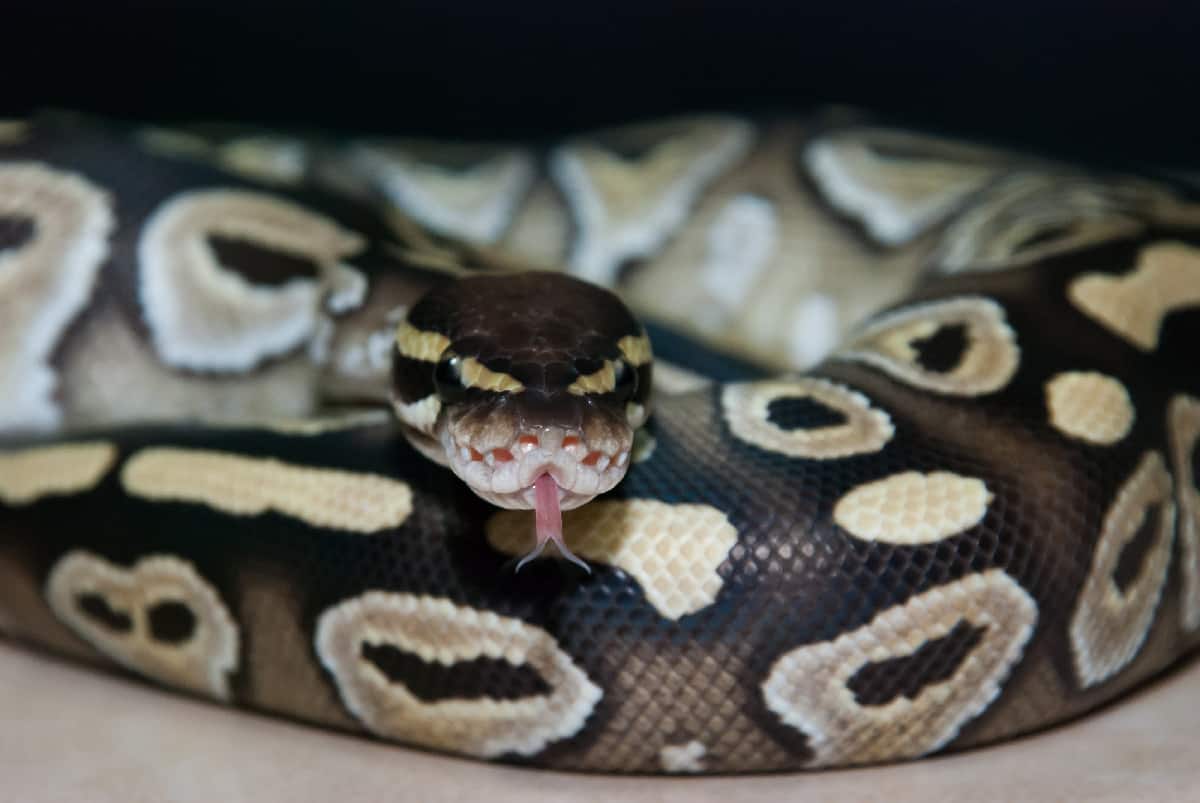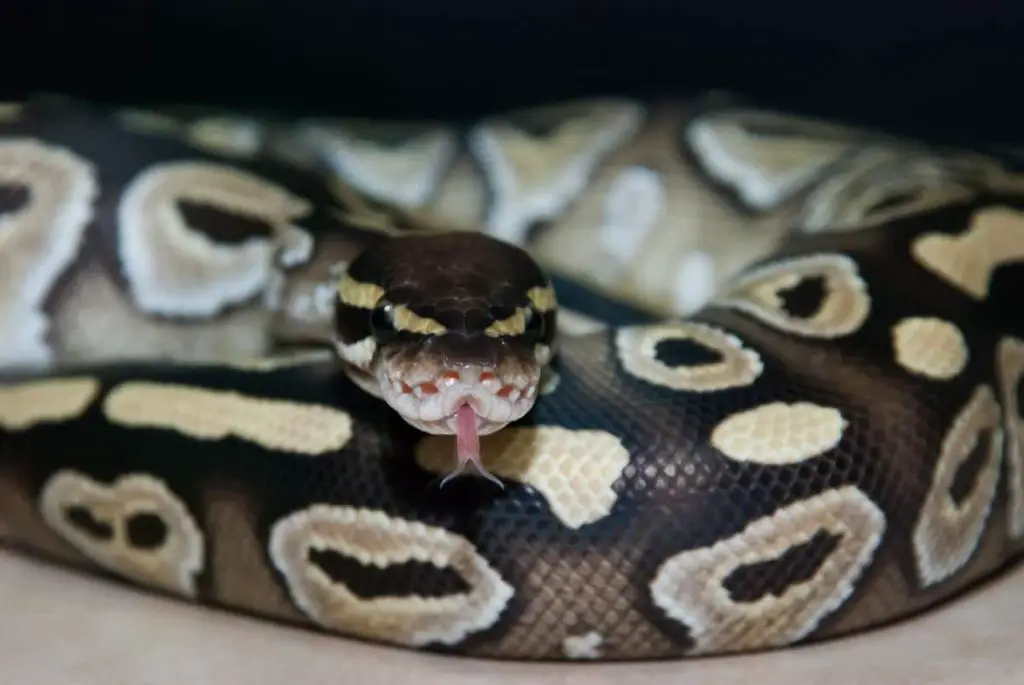Ball pythons are one of the most popular pet snakes worldwide, with their manageable size and docile nature. However, many owners may wonder if their beloved pythons are nocturnal creatures. Understanding their behavior and activity patterns can help owners provide the best possible care for their pets.
While ball pythons are not strictly nocturnal, they are crepuscular. This means that they are most active during dawn and dusk, with increased activity during these times. Understanding their natural activity patterns can help owners provide a comfortable and stress-free environment for their pythons, ensuring that they are happy and healthy pets.

H2: Are Ball Pythons Nocturnal?
Ball pythons are fascinating creatures that are popular as pets due to their docile nature, ease of care, and striking appearance. One question that often arises among ball python owners is whether these snakes are nocturnal or not. In this article, we will explore the natural behavior of ball pythons and determine whether they are nocturnal or not.
H3: What is Nocturnality?
Nocturnality is a term used to describe animals that are primarily active at night and rest during the day. This behavior is common among many animals, including some species of reptiles such as geckos and chameleons. Nocturnal animals have adapted to low-light conditions and have developed specialized senses to navigate and hunt in the dark.
Ball pythons, on the other hand, are not strictly nocturnal. In the wild, they are crepuscular, which means they are most active during dawn and dusk. During the day, they will seek shelter in burrows, rock crevices, or under vegetation to avoid the heat and potential predators.
H3: Ball Pythons Activity Patterns
In captivity, ball pythons can adapt to their owner’s schedule and become more active during the day, especially if they are fed during the day. However, they still retain their crepuscular behavior and will be most active during dawn and dusk.
Owners can observe their ball pythons’ activity patterns by monitoring their behavior during the day and night. Ball pythons that are active during the day might be more skittish and stressed, while those that are active during the night might be more relaxed and comfortable.
H3: Benefits of Nocturnal Behavior
Nocturnal behavior has several benefits for animals. One of the most significant benefits is that it allows animals to avoid the heat and potential predators during the day, which can reduce their risk of dehydration and death. Nocturnal animals have also developed specialized senses, such as night vision and hearing, that allow them to navigate and hunt in low-light conditions more effectively.
In the case of ball pythons, their crepuscular behavior allows them to hunt for prey during the low-light conditions of dawn and dusk. This behavior is especially beneficial in their natural habitat, where they prey on small mammals and birds.
H3: Ball Pythons and Light
Light plays a crucial role in the behavior of ball pythons. In the wild, they use cues from the sun and other natural light sources to regulate their activity patterns and other behaviors, such as breeding and hibernation.
In captivity, owners must provide their ball pythons with a suitable light cycle to ensure their health and well-being. This includes providing a regular day-night cycle and avoiding exposure to bright or direct light, which can stress and harm the snakes.
H3: Ball Pythons vs. Other Reptiles
Compared to other reptiles, ball pythons are not as strictly nocturnal. Many reptiles, such as geckos and chameleons, are exclusively nocturnal and have adapted to low-light conditions in unique ways. Ball pythons, on the other hand, are crepuscular and can be more active during the day if they are fed and cared for properly.
However, like other reptiles, ball pythons can benefit from low-light conditions and should be provided with a suitable environment that mimics their natural habitat. This includes providing hiding places, such as rocks or logs, and avoiding bright or direct light.
H3: Conclusion
In conclusion, ball pythons are not strictly nocturnal but are crepuscular, which means they are most active during dawn and dusk. In captivity, they can adapt to their owner’s schedule and become more active during the day if they are fed and cared for properly. However, they still need a suitable light cycle and environment that mimics their natural habitat.
Providing ball pythons with a suitable environment and care can help ensure their health and well-being and allow owners to enjoy their fascinating behavior and unique characteristics.
Frequently Asked Questions
Ball pythons are one of the most popular pet snakes due to their docile nature and manageable size. However, many first-time snake owners often wonder if ball pythons are nocturnal. Here are some frequently asked questions and answers about ball pythons and their sleep habits.
Are ball pythons nocturnal?
Yes, ball pythons are primarily nocturnal. In the wild, they are known to be active during the night and rest during the day. However, in captivity, they may adjust their sleep schedule based on their environment and feeding schedule.
While they are active at night, ball pythons may also be active during the day, especially if they are hungry or thirsty. It’s important to provide them with a comfortable and secure enclosure that allows them to hide and rest during the day if needed.
Do ball pythons need darkness to sleep?
While ball pythons are nocturnal, they do not necessarily need complete darkness to sleep. They may adjust to dim lighting or even a room with natural light. However, it’s important to provide them with a consistent day and night cycle to maintain their natural sleep pattern.
It’s also important to avoid sudden changes in lighting or temperature, as this can disrupt their sleep and cause stress. A comfortable and secure enclosure with a consistent environment can help ball pythons feel safe and secure, allowing them to rest and sleep comfortably.
How much do ball pythons sleep?
Ball pythons can sleep for several hours a day or even up to 18 hours a day. Their sleep patterns may vary based on factors such as their age, health, and environment. Young ball pythons may require more sleep, while adult ball pythons may be more active during the night.
It’s important to monitor your ball python’s sleep patterns and behavior to ensure they are healthy and comfortable. If you notice any changes in their sleep habits, it’s important to consult with a veterinarian to rule out any underlying health issues.
What are signs that a ball python is sleeping?
When ball pythons sleep, they may curl up in a tight ball or hide in their enclosure. Their breathing may also become slower and more rhythmic. While they are sleeping, they may be less responsive to external stimuli and may not move around as much.
It’s important to avoid disturbing a sleeping ball python, as this can cause stress and disrupt their sleep pattern. If you need to handle your ball python, it’s best to do so during their active hours at night or during the day when they are awake and alert.
Can you wake up a sleeping ball python?
While it’s possible to wake up a sleeping ball python, it’s not recommended. Disturbing their sleep can cause stress and disrupt their natural sleep pattern. It’s best to let them sleep and only handle them during their active hours at night or during the day when they are awake and alert.
If you need to check on your ball python while they are sleeping, you can do so by observing them from a distance or using a camera. It’s important to respect their need for rest and sleep, as this is essential for their overall health and wellbeing.
Bioactive Night Cam: Spying On My Ball Python
In conclusion, after examining the behavior and habits of ball pythons, it can be said that they are primarily nocturnal creatures. While they may be active during the day, their natural inclination is to be more active at night. This is due to their physiology and their hunting instincts, which are best suited for nighttime activities.
However, it is important to note that individual ball pythons may have different activity patterns based on their environment and their personal preferences. Some may be more active during the day if they are used to being handled or if they have access to food and water during daylight hours.
Overall, if you are considering getting a ball python as a pet, it is important to provide them with a suitable environment that allows for both daytime and nighttime activities. This can include providing hiding spots and a variety of enriching toys and activities to keep them engaged and healthy. With proper care and attention, ball pythons can thrive and be fascinating pets for years to come.


